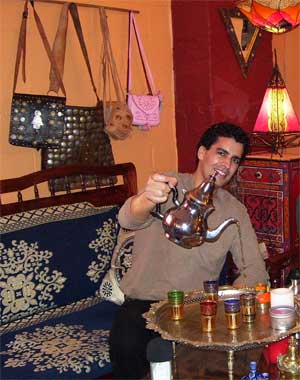By Ashley Taylor Addi Ouadderrou poured Moroccan mint tea from high above the glass tea cups, partly to cool it off, partly for show. He offered some to me, along with drinking instructions: in Moroccan culture, it is okay to slurp. "We drink both tea and air." Ouadderrou said that Moroccans traditionally drink three cups of tea per day. Through a cup of tea, Ouadderrou shared an important part of his culture. Moroccan mint tea is one of the many traditions Ouadderrou has been sharing with acquaintances since he moved from Southeastern Morocco to Watertown, Massachusetts, in 1997 and opened a Moroccan imports shop, Moroccan Caravan, in Union Square. He also shares his culture by performing traditional Moroccan music in his band, Amoud. "Amoud means seeds, seeds that can grow and prosper, and we symbolize ourselves as seeds of our culture that will grow and prosper and flourish," Ouadderrou said. The culture that they disseminate belongs to a particular group of Moroccans, the Amazighen. |
||||
The Amazighen (pronounced Am-a-zeer-en) are the people of North Africa who speak the language Tamazight (pronounced Tam-a-zeert). Ouadderrou gave some background on his language: "Tamazight is spoken all over Morocco, from the East to the West to the North to the South. Because Tamazight is the native language of Morocco. Not only Morocco, but all North Africa. Morocco's native language was Tamazight before Arabic became the official language there." Despite its age and its many speakers, Ouadderrou explained, Tamazight has an inferior status in Moroccan culture. "It's spoken by the majority, but it is considered the language of the minority," he said with regret.
Amoud extols Amazigh culture by playing traditional Amazigh music. Ouadderrou describes Amoud's style: "Our music is Amazigh music. The language spoken is Tamazight. And it takes from poems that are written by many other great poets, Amazigh natives of Morocco, and these poems talk about love, about nature, about the people."
The five band members, all Amazighen, play traditional North African instruments. They beat the djembe, the tamtam, and the allun drums. They jingle the qraqeb, or steel hand cymbals. They strum the six-string banjo and another stringed instrument, the sentir. Over the instrumentals, they sing in Tamazight.
The band formed in January, around the time of the Amazigh New Year. Amoud first performed at Boston City Hall on Morocco Day this February. The group's next performance will be at the Mimouna celebration at the Center for Arts at the Armory in Somerville, on April 10.
Mimouna is a holiday that Moroccan Jews traditionally celebrate on the day after Passover to mark Passover's end and to hope for a year of prosperity. Mimouna began in Morocco but has spread to Israel and beyond.
Not only Jews, but also Muslims, participate in this holiday, as Ouadderrou described: "During Mimouna, both Jews and Muslims get together and they celebrate, they share, and they appreciate the life that they live together." This unifying tradition stands in contrast to the disputes over land rights in Israel that often divide Muslims and Jews. This year's Mimouna concert is a collaboration between two organizations that promote Jewish and Muslim cultures, respectively: Prism, the youth initiative at the New Center for Arts and Culture, and the American Islamic Congress.
Eva Heinstein, Co-Director of Prism, described how Jews and Muslims of Morocco would celebrate Mimouna. She said that, during Passover, Jews would symbolically sell their leavened foods to their Muslim neighbors. On Mimouna, she said, "the Muslim neighbors would bring back these things that were given to them for safekeeping over the eight days, and they would bring gifts of bread and desserts and leavened foods."
Somerville's Mimouna celebration will bring together Jews, Muslims, and anyone else who wants to make merry. The festivities will include refreshments, a fashion show, music, dance, and more. The revelry begins at 8:15 p.m. Tickets cost $10 in advance and $15 at the door.
Bringing together people of different cultures is just what Amoud hopes to do. Ouadderrou says, "We feel it's our duty to help people understand about us, about our culture. And also help create and enlighten people's minds and create better understanding, because I think if people, no matter where they're from, if these people interact and they learn about each other, I think there will be better understanding."














Reader Comments